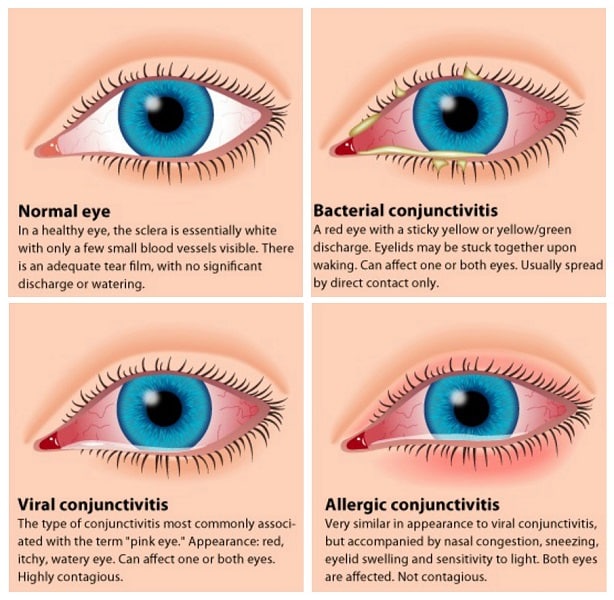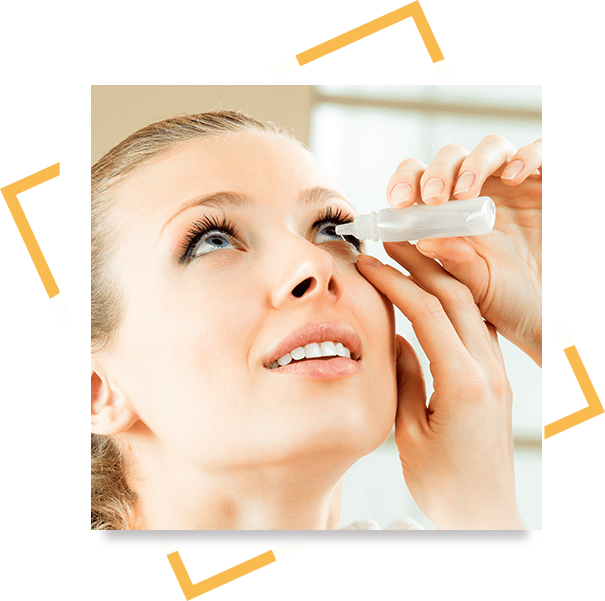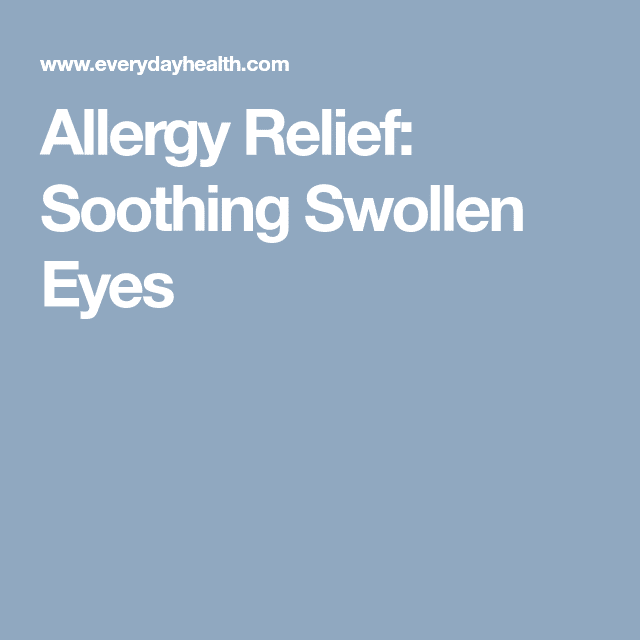What Causes Eye Allergies
Eye allergies are a reaction to indoor and outdoor allergens that get into your eyes. Examples of these are pollen, mold spores, dust mites and pet dander. Eye allergies are not contagious. They cannot be spread to another person.
Irritants like dirt, smoke, chemicals, and chlorine can also cause swelling and redness of the eyes. This reaction is not an allergic reaction. Viruses and bacteria can also cause the same irritation of the eyes. This reaction is also not an allergic reaction. Some medications and cosmetics can also cause eye allergy symptoms.
The eyes are an easy target for allergens and irritants because they are exposed and sensitive. The body responds to these allergens by releasing chemicals, including histamines, which produce the inflammation.
Pink eye is something different. It is a viral or bacterial infection of the eye tissue. Its called infectious conjunctivitis. It usually starts in one eye and can spread easily to the other eye within a day or two. This eye condition is easily transmitted from person to person. But it is usually not a serious health risk if diagnosed right away.
Articles On Eye Allergies
Millions of Americans have allergies. Most of those millions have symptoms involving their eyes.
A common eye allergy affects the clear layer of skin that covers the front of your eyes and the inside of your lids . Your doctor may refer to it as allergic conjunctivitis.
There are several different causes for this. But for the most part, if you’re allergic to a particular substance and then come into contact with it, you have an allergic reaction like itching and sneezing.
Your Period Is On The Way
You know how bloated you feel during the week before your period and through those first few heavy-flow days? That same waterlogged effect can leave your eyes swollen as well.
It has to do with hormone fluctuations that occur with premenstrual syndrome . According to the American College of Obstetricians and Gynecologists, changes in estrogen and progesterone cause fluid retention all through your bodyincluding your peepers. “While that time of the month isn’t a puffy-eye trigger for all women, it can contribute to swelling in some,” said Dr. McLaughlin.
The good news: When your period nears its end, the swelling should subside, whether it’s around your eyes or elsewhere.
Related:Water Weight Causes and 4 Ways To Prevent It
Puffy eyes are common and persistent beauty challenges for many people. They can occur because of lack of sleep, allergies, or aging.
In addition to treating the root cause of eyelid swelling, there are a few things you can do to reduce eye puffiness. Applying a cool compresslike a cold washcloth, cool tea bag, or cucumber slicesto the eyes for a few minutes can help to de-puff eyelids.
Consider adding potassium-rich foods like bananas or leafy greens to your diet. According to the National Institutes of Health, the mineral helps to relieve water retention. And drink lots of water, toothis helps to flush out excess fluid your system is holding on to.
For more Health news, make sure to
Read the original article on Health.
Don’t Miss: Can You Develop An Allergy To Alcohol
How To Treat Eye Allergies At Home
Eye allergies, also called allergic conjunctivitis, are quite common. They occur when the eyes react to something that irritates them . The eyes produce a substance called histamine to fight off the allergen. As a result, the eyelids and conjunctiva become red, swollen and itchy, and they may tear or burn.
The key to treating eye allergies is to avoid or limit contact with the allergen. However, there are easy treatments that can help to relieve the eyes.
Artificial Tears Eye Drops

Non-prescription eye drops may be sufficient in providing short term relief of mild symptoms. Artificial tears both moisten the eyes to soothe irritation, and wash allergens away. These drops can be used as often as needed and are available over-the-counter at your local drug store.
There are many different brands of artificial tears on the market, so ask your eye doctor for a recommendation.
You May Like: Is There A Test For Milk Allergy
Amp Up The Compress With Calendula Or Chamomile For Swollen Red Eyes
Both calendula and chamomile have inflammatory properties which can soothe irritated eyes. Up the power of your eye compress with these. Boil a cup of distilled water and steep 2 teaspoons of dried chamomile or calendula flowers in it. Strain the solution and allow it to cool. Now soak a clean washcloth in it, wring out the excess water, and apply it over closed eyelids for about 20 minutes.2 However, do keep in mind that some people are allergic to chamomile or calendula, so do a patch test before using this remedy.
Causes Of Eye Allergies
That layer of skin covering the front of your eyes? Itâs the same type of skin that lines the inside of your nose. Because these two areas are so similar, the same things can trigger allergic reactions in both places.
Common triggers include:
If you have seasonal allergies, you generally have symptoms for a short time. You may be bothered in the spring by tree pollen, in the summer by grass pollen, or in the fall by weed pollen. The symptoms tend to clear up during other times of the year, especially in the winter.
If you have “perennial allergies,” your symptoms probably last all year. You’re likely allergic to indoor things, like dust mites, cockroaches, and pet dander. Seasonal outdoor allergens may make things worse if youâre sensitive to them, too.
You May Like: What To Take For Peanut Allergy
The Difference Between Eye Allergy And Conjunctivitis
There is a thin membrane covering the eyeball called the conjunctiva, and sometimes a kind of inflammation occurs, and that conjunctiva becomes inflamed and this condition is known as the pink eye.
There are many similar symptoms between conjunctivitis and eye allergies, such as:
but some severe secretions are the most characteristic symptoms of conjunctivitis. and the causes of infection in each case differ from the other, the causes that lead to the pink eye are:
- Bacterial infections.
- Damaged or not cleaned contact lenses.
- Constant exposure to chemicals.
Eye Drops For Moderate To Severe Allergies
These are usually decongestant eyes drops, importantly these type of eye drops are not recommended if you have glaucoma.
These eye drops are over-the-counter and are used to reduce redness by narrowing the blood vessels in the eye. They are available in two forms: decongestant only, and decongestant with an antihistamine recommended for relief of severe itching.
You May Like: Do You Have A Fever With Allergies
Artificial Sweeteners Are Part Of Your Diet
You may be surprised to learn that artificial sweeteners may be behind your puffy eyes. Artificial sweeteners, like saccharin, aspartame, and sucralose, can be difficult to process and cause water retention, according to research published in the journal Appetite.
When we lay down to sleep at night, the excess fluid can pool in your face and eyelids, leading to eyelid puffiness. Cutting out artificial sweeteners may relieve the problem.
Related:10 Reasons to Give Up Diet Soda
Wash Your Hands Frequently
Why are we talking about hands when this is about eyes? Because when we have burning, watery eyes or red, itchy eyes, we tend to touch and rub our eyes, which can make our irritated eyes feel worse. Washing hands after petting a cat or dog, dusting, vacuuming, being outside or bringing in flowers is important. Having clean hands means if you do accidentally rub your eyes, youre at least less likely to add more allergens to them.
Read Also: Can Sinus And Allergies Cause Dizziness
Treatment Depends On Severity And Cause Of Symptoms
Identifying and removing the cause of allergic conjunctivitis, where possible, is ideal when an allergic cause has been confirmed from allergy testing. For example:
- House dust mite minimisation measures in the bedroom .
- Removing the cat from the house in sensitive individuals.
It is also important to exclude the presence of a foreign body such as dust, wood chip or an insect/s.
Symptoms of allergic conjunctivitis are generally mild to moderate and respond to bathing eyes with cold water, ice packs and cold water compresses. Topical lubricants can also help flush allergens from the tear film. However, symptoms can sometimes be extremely severe and debilitating and require medication. Treatment options include:
What Are Eye Allergies

When a foreign particle or substance such as dust enters your eye, your body naturally releases histamine to protect you. An eye allergy can occur as your immune systems reaction to the presence of the irritant or allergen.
This reaction is also called allergic conjunctivitis, and it can cause eyelid discomfort and swelling. It can also affect the conjunctiva, the tissue layer that covers the front part of your eye and lines the inside of your eyelids.
You may also experience itching and a persistent urge to rub your eyes. In more serious cases, your eye turns so red and swells so much as it seeks to fight off the allergen that it seems as if it is infected. Such allergies are common, but not everybody has a significant reaction when dust or pollen gets into their eyes. They have a higher level of tolerance, just as some people are more vulnerable.
You may be at risk, too, if you experience nose allergies on exposure to foreign particles inside and outside your home or office environment. The severity of your allergic reaction can vary based on many factors.
While some people experience only lid inflammation, others suffer corneal irritation and scarring. You can minimize your risk of developing eye allergy complications with early management and treatment.
Also Check: Can Bee Allergies Go Away
How Can I Prevent Eye Allergies
The easiest way to prevent allergic reactions is to minimize your exposure to potential allergens. Use an indoor air purifier, vacuum frequently to keep your home dust-free, and avoid exposure to harsh chemicals, dyes, and perfumes. Those with pollen allergies should close windows when the pollen count is high.
Prescription Eye Drops And Medications
Prescription eye drops and medications also are used to treat eye moderate to severe allergies, and provide both short- and long- term relief.
There are many different types of prescription eye drops:
Antihistamine eye drops reduce itching, redness and swelling. These drops provide fast relief, but need to be used frequently throughout the day, as the effects tend to last only a few hours.
Mast cell stabilizer eye drops prevent the release of histamine and other chemicals that cause the allergic reaction. These drops must be used before allergen exposure to prevent itching.
Antihistamine and mast cell stabilizer eye drops are a combination eye drop that treats and prevents eye allergies. These drops are inserted twice a day for fast, long-lasting relief of itching, burning, tearing, and redness.
NSAID eye drops relieve itching, but may cause burning or stinging when inserted, and need to be used four times a day.
Corticosteroid eye drops treat chronic and severe itching, redness and swelling. These steroidal eye drops should only be used long term under a doctors supervision as they can cause an increased risk of infection, glaucoma and cataracts.
Oral antihistamines
If eye drops are not sufficient in treating your allergies, your eye doctor may recommend an oral antihistamine for further relief.
Allergy shots
Don’t Miss: When Is Allergy Season Over In Nyc
Symptoms Of Allergies Affecting The Eyes
You may experience the following symptoms when you have an eye allergy:
- Abnormal sensitivity to light
While nasal and eye allergies can affect you at the same time, neither of them causes the other. Both your eyes and nose may have been exposed to an allergen if you get these two conditions simultaneously.
In that case, you may also experience other discomforts like nasal congestion, post-nasal drip, coughing and frequent sneezing.
You’re Sensitive To Fragrance
Allergens like pollen and pet dander aren’t the only airborne particles that can cause puffy eyes. Perfumes and scented products can also contribute to puffinessbecause a person has an allergy to the fragrance or they simply have sensitive eyes.
“When choosing products, try to use products that are fragrance-free,” said Dr. Jaliman. When you spritz on perfume in particular, aim it away from your face to keep scented particles as far from your eyes as possible.
Fragrance sensitivity is nothing new: A March 2017 study published in the journal Preventive Medicine Reports found that exposure to fragrances can lead to a host of negative reactions, like migraines and difficulty breathing. And 14% of people in the study reported having eye issues when they were within smelling distance of certain scents.
Read Also: Do Allergies Cause Throat Pain
If You Suffer From Red Sore Allergic Eyes There Are Several Ways To Prevent This Condition From Affecting Your Life
Allergies are a common complaint, and can cause a great deal of discomfort sneezing, sniffling, stuffy nose, and itchy throat can all affect your daily functioning.
What you may not realize is your eyes can also be affected by allergies.
Up to 25 percent of people worldwide suffer from eye allergies.
Many eye allergies symptoms occur with the symptoms you may already be aware of. If your eyes are itchy, red and irritated, and there is no other explanation, allergies may be the cause.
What Do I Do If I Think I Have Dry Eye Caused By Ocular Allergies
The best thing that you can do for dry eyes is to see your eye doctor. The Wilkinson Eye Center Dry Eye Clinic has many tools to evaluate the status of the function and structure of the glands to determine the nature and best dry eye treatment plan for you. We offer screening with LipiScan, a sophisticated imaging device that enables us to observe and track the structure of the Meibomian glands.
Dry eyes can be treated successfully. We invite you to schedule a comprehensive consultation and examination at our office in Pontiac, MI or Clarkston, MI. Contact us at or fill out a Contact Form here.
Read Also: What Allergy Meds Can You Take While Pregnant
What Are The Differences Between Eye Allergies And Pink Eye
The eyeball is covered by a thin membrane called the conjunctiva. When the conjunctiva becomes irritated or inflamed, conjunctivitis can occur.
Conjunctivitis is more commonly known as pink eye. It causes the eyes to become watery, itchy, and red or pink.
Although pink eye and eye allergies cause similar symptoms, theyre two distinct conditions.
Eye allergies are caused by an adverse immune reaction. Pink eye, however, is the result of eye allergies as well as other causes.
These include:
Normally, the immune system promotes chemical changes in the body that help fight off harmful invaders, such as bacteria and viruses.
However, in people with allergies, the immune system mistakenly identifies an allergen, which may be otherwise harmless, as a dangerous intruder and begins to fight against it.
Histamine is released when the eyes come into contact with an allergen. This substance causes many uncomfortable symptoms, such as itchy and watery eyes. It can also cause a runny nose, sneezing, and coughing.
An eye allergy may happen at any time of year. However, its especially common during the spring, summer, and fall months when trees, grasses, and plants are in bloom.
Such reactions can also occur when a sensitive person comes into contact with an allergen and rubs their eyes. Food allergies may also cause eye allergy symptoms.
Is It Pink Eye Or Allergies

It can be difficult to tell the difference between allergic conjunctivitis and pink eye, a conjunctivitis caused by a virus or bacteria. Eye allergy tends to clear secretions and itching, while bacterial infections causing pink eye usually involve yellow or greenish discharge. Most conjunctivitis is viral rather bacterial and resolves well after applying warm compresses. If only one eye is affected, take care to not touch or apply anything to the unaffected eye after touching the eye with the issue.
Never put corticosteroid drops into your eyes without having a comprehensive eye exam. It is very difficult to tell the difference between conjunctivitis caused by allergy or conjunctivitis caused by bacteria corticosteroids can be dangerous with certain bacterial diseases. Eye allergy tends to cause clear secretions and itching, while bacterial infections usually involve yellow or greenish secretions.
If you suspect that you have eye allergies visit a healthcare professional. Preventing and treating eye symptoms may be part of your overall treatment plan.
Also Check: How To Remove Fluid In Ear From Allergies
Minimize Irritants In Your Home
Investing in an air purifier can help eliminate potential allergens from lingering in your home and causing a reaction. Make sure to regularly change the filter to ensure the air in your home remains clear of irritants.
It is also a good idea to keep your windows closed as much as possible, regularly wash your bedding, vacuum your floors, and dust around your home. This helps eliminate any potential allergens like dust mites, pollen, and dander from becoming a problem inside your house.
Visit Pearland Eye Care In Houston For Eye Allergy Diagnosis And Treatment
You should receive a thorough eye examination before you use allergy medication or over-the-counter eye drops. That way, an eye doctor can check if theres something else going on that requires medical attention. Our optometrists at Pearland Eye Care in Houston, TX, can perform a comprehensive eye examination to see what might be causing your eye allergies and offer the right treatment. Contact us at 991-4100 to book your appointment.
Recommended Reading: What Foods Help With Allergies

